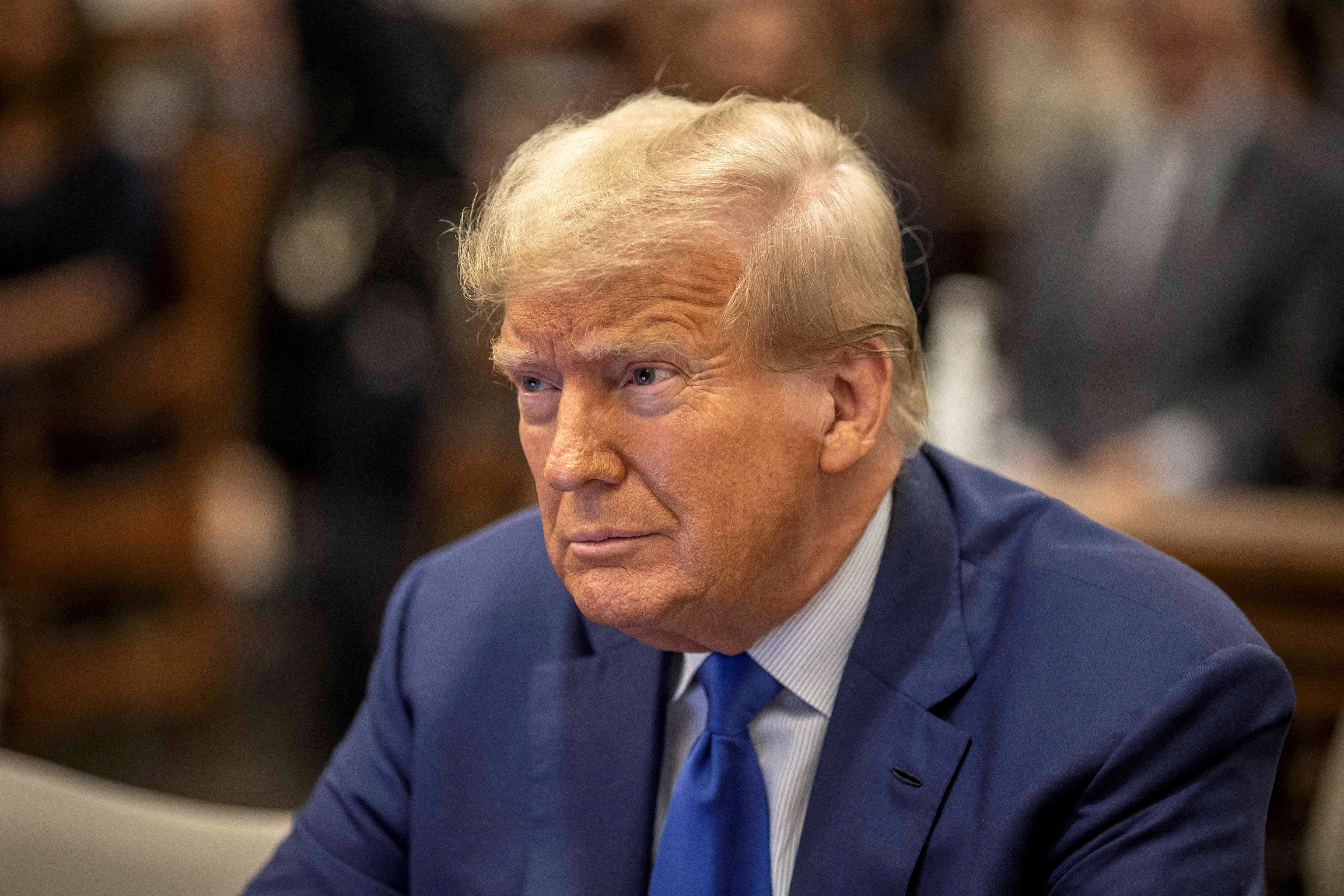前总统唐纳德·特朗普正逐渐摆脱试图禁止他参加各州2024年的投票根据第14修正案第3节,一项宪法条款规定,如果一个人曾经担任过职务,向宪法宣誓,然后从事反对美国的“叛乱或反叛”,那么他就没有资格竞选公职
过去两周,密歇根州和明尼苏达州的法官裁定,2024年共和党初选领跑者特朗普可以参加这两个州的投票,驳回了公民和监督组织提起的诉讼,这些诉讼声称,这位前总统应该被禁止,因为他在2021年1月6日左右的行动,美国国会大厦的骚乱以及扭转他2020年选举失利的努力。
特朗普的团队拒绝了这一观点,声称这是不民主和边缘理论。他否认了与1月6日有关的所有不当行为。
这剩余的主要诉讼寻求根据第3节取消特朗普的资格在科罗拉多州,可能会在本周末决定。

2023年10月25日,前总统唐纳德·特朗普在纽约市的纽约州最高法院出席特朗普组织民事欺诈审判。
戴夫·桑德斯/路透社
特朗普来自科罗拉多州六名共和党和无党派选民的挑战,由监督组织华盛顿公民责任和道德协会(CREW)代表,将于周三晚上在丹佛进行结案陈词。
预计之后不会立即做出裁决,但地区法官莎拉·b·华莱士(Sarah B. Wallace)表示,她可能会在48小时内做出决定,肯定会在感恩节之前。
华莱士在11月初举行的历史性的为期五天的听证会之前,一致否决了特朗普和科罗拉多州共和党提出的驳回诉讼的动议。
她还否认了他们在听证会第二天提出的直接裁决驳回案件的动议,当时他们在请愿人的证人名单后辩称,特朗普在袭击发生前1月6日的讲话并没有因为第一修正案而取消他的候选人资格。
特朗普竞选团队周三再次发表声明,呼吁驳回此案。
在听证会上,摄制组带来了专家证人讨论政治极端主义,证明“暴动”一词以及第14修正案第3部分的历史和意义。
CREW还打电话给1月6日在国会大厦的两名警察和加州众议员Eric Swalwell,一名在里面的民主党人。
特朗普的律师传唤的证人包括前特朗普政府官员卡什·帕特尔(Kash Patel)、前特朗普竞选发言人卡特里娜·皮尔森(Katrina Pierson)和1月6日上午白宫附近活动的另一名组织者,特朗普在其中一些人游行到国会大厦之前向支持者发表了讲话。
他的律师还打电话给即将退休的科罗拉多州共和党众议员肯·巴克(Ken Buck),他曾公开反对2020年选举否认主义,但也批评了1月6日调查众议院委员会的工作-这些努力在很大程度上与克鲁的新案件类似。
周二,密歇根索赔法庭驳回了两起第14修正案诉讼特朗普质疑他在2024年出现在该州初选投票中的资格。
特朗普团队提起的第三起诉讼要求法官詹姆斯·罗伯特·雷德福宣布,密歇根州的民主党国务卿乔斯林·本森(Jocelyn Benson)无权决定候选人是否可以被取消该州的初选资格。
雷德福周二批准了这一请求,认为决定特朗普资格问题的是国会,而不是司法部门。
法官还裁定,根据州法律,他无权命令选举官员根据第14修正案审查特朗普的资格。
第14修正案挑战背后的团体之一——人民自由言论组织(FSFP)在密歇根州就针对Trump的案件进行了辩论。该团体在一份声明中告诉ABC新闻,他们将立即向密歇根上诉法院提起上诉,并将要求密歇根最高法院直接受理他们的案件。
在密歇根州提起第二起诉讼的维权人士罗伯特·戴维斯(Robert Davis)也表示,他计划申请紧急延期,以暂停下级法院的裁决。
专家们说,对这些取消资格案件的上诉可能会上诉到美国最高法院.
在密歇根州发布命令之前,明尼苏达州最高法院上周就另一项FSFP诉讼做出裁决,裁定特朗普被允许留在该州的初选投票中,但没有就请愿人的宪法论点做出裁决,即特朗普在1月6日之前的行为相当于他“参与叛乱”
明尼苏达州的命令也没有阻止挑战者“提出申诉”,因为这与大选有关,而不仅仅是共和党的初选。
FSFP没有明确表示他们是否会在明尼苏达州提起上诉。
这位前总统的竞选团队对密歇根州和明尼苏达州的解雇做出了回应,声称法院的裁决证实了他们的论点,即第14修正案第3节正被用来干扰选举。
特朗普发言人张致恒说:“这些荒谬的案件每一个都失败了,因为它们都是违反宪法的左翼幻想……寻求将选举移交给法院,并剥夺美国人民选择下一任总统的权利。”。
“虽然特朗普竞选团队欢迎密歇根州的这些驳回,并预计未来会驳回其他第14修正案的案件,但我们最关注的是再次赢得伟大的密歇根州和特朗普总统明年的连任,”他继续说道。
虽然特朗普在2016年赢得了密歇根州,超过了希拉里·克林顿,但他在2020年以微弱优势输给了乔·拜登。
14th Amendment challenges to Trump's campaign fail in 2 states with Colorado case pending
Former President Donald Trump is gradually shaking offattempts to bar him from individual states' 2024 ballotsunder Section 3 of the 14th Amendment, a constitutional clause which disqualifies people from running for office if they previously held office, swore an oath to the Constitution and then engaged in "insurrection or rebellion" against the U.S.
Judges in Michigan and Minnesota over the past two weeks have ruled that Trump, the 2024 Republican primary front-runner, can be on the ballot in both states, dismissing lawsuits filed by citizens and watchdog organizations that claimed the former president should be barred because of his actions around the Jan. 6, 2021, riot at the U.S. Capitol and efforts to reverse his 2020 election loss.
Trump's team has rejected that argument, claiming it is undemocratic and a fringe theory. He has denied all wrongdoing related to Jan. 6.
Theremaining major lawsuit seeking to disqualify Trump under Section 3, in Colorado, could be decided by the end of the week.
Trump's challenge from six Republican and unaffiliated voters in Colorado, represented by the watchdog group Citizens for Responsibility and Ethics in Washington (CREW), will wrap up on Wednesday evening with closing arguments in Denver.
No ruling is expected directly afterwards, but District Judge Sarah B. Wallace has said she would likely make a decision on the suit within 48 hours and definitely before Thanksgiving.
Wallace uniformly ruled against a number of Trump and the Colorado Republican Party's motions to dismiss the lawsuit ahead of a historic five-day evidentiary hearing at the beginning of November.
She also denied their motion for a directed verdict to dismiss the case on day two of the hearing, when they argued after the petitioners' slate of witnesses that Trump's speech on Jan. 6 before the attack did not disqualify him from candidacy due to the First Amendment.
The Trump campaign on Wednesday issued a statement again calling for the case to be dismissed.
At the evidentiary hearing,CREW brought in expert witnessesto discuss political extremism and testify about the phrase "insurrection" and the history and meaning of Section 3 of the 14th Amendment.
CREW also called two police officers who were at the Capitol on Jan. 6 and California Rep. Eric Swalwell, a Democrat who was inside.
Among the witnesses that Trump's attorneys called were former Trump administration official Kash Patel, former Trump campaign spokeswoman Katrina Pierson and another organizer of the event near the White House on the morning of Jan. 6 where Trump spoke to supporters before some of them marched to the Capitol.
His attorneys also called retiring Rep. Ken Buck, a Colorado Republican who has spoken out against 2020 election denialism but also criticized the work of a House committee that investigated Jan. 6 -- efforts that were largely similar to CREW's new case.
On Tuesday the Michigan Court of Claimsdismissed two 14th Amendment lawsuitsagainst Trump which challenged his eligibility to appear on the state's primary election ballot in 2024.
A third lawsuit, which Trump's team filed, asked Judge James Robert Redford to declare that Michigan's Secretary of State Jocelyn Benson, a Democrat, does not have the authority to determine whether a candidate can be disqualified from the state's primary ballot.
Redford granted that request on Tuesday, finding that it was Congress' role, not the judicial branch, to decide on the matters of Trump's eligibility.
The judge also ruled that under state law, he did not have the power to order election officials to examine Trump's eligibility based on the 14th Amendment.
Free Speech For People (FSFP), one of the groups behind the 14th Amendment challenges, argued one of the cases against Trump in Michigan. The group told ABC News in a statement that they will file an immediate appeal to the Michigan Court of Appeals and will ask the Michigan Supreme Court to take up their case directly.
Activist Robert Davis, who filed the second lawsuit in Michigan, has also said he plans to file an emergency stay to pause the lower court ruling.
Experts have said that an appeal for any of these disqualification casescould make its way up to the U.S. Supreme Court.
The orders in Michigan follow a ruling from the Minnesota Supreme Court on another FSFP lawsuit last week that found Trump is allowed to remain on the state's primary ballot but did not rule on the petitioners' constitutional argument that Trump's actions ahead of Jan. 6 amounted to him "engaging in insurrection."
The Minnesota order also did not stop the challengers from "bringing a petition raising their claims" as it relates to the general election rather than just the Republican primary.
FSFP has not made clear if they will file an appeal in Minnesota.
The former president's campaign responded to the dismissals out of Michigan and Minnesota, claiming the courts' rulings validated their arguments that Section 3 of the 14th Amendment is being used to interfere with the election.
"Each and every one of these ridiculous cases have LOST because they are all un-Constitutional left-wing fantasies … seeking to turn the election over to the courts and deny the American people the right to choose their next president," Trump spokesman Steven Cheung said.
"While the Trump Campaign welcomes these dismissals in Michigan and anticipates the future dismissals of the other 14th Amendment cases, we are most focused on once again winning the great state of Michigan and the re-election of President Trump next year," he continued.
While Trump won Michigan in 2016, over Hillary Clinton, he narrowly lost it to Joe Biden in 2020.





